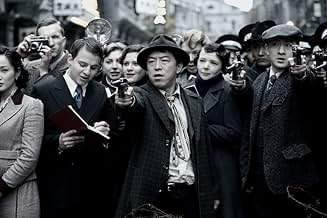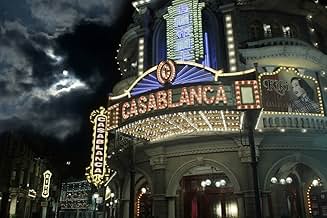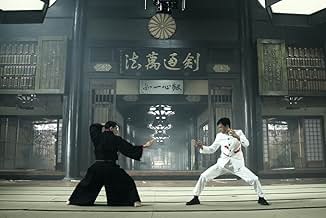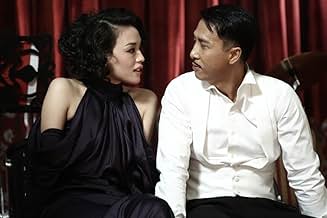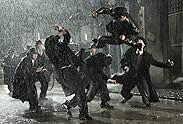IMDb-BEWERTUNG
6,2/10
11.322
IHRE BEWERTUNG
Füge eine Handlung in deiner Sprache hinzuThe year is 1917 and Chen Zhen, believed to be dead, returns to Shanghai under a false name. He joins a mob boss for info on the Japanese incl. a long kill list and at night fights the Japan... Alles lesenThe year is 1917 and Chen Zhen, believed to be dead, returns to Shanghai under a false name. He joins a mob boss for info on the Japanese incl. a long kill list and at night fights the Japanese masked.The year is 1917 and Chen Zhen, believed to be dead, returns to Shanghai under a false name. He joins a mob boss for info on the Japanese incl. a long kill list and at night fights the Japanese masked.
- Auszeichnungen
- 4 Nominierungen insgesamt
Anthony Chau-Sang Wong
- Liu Yutian
- (as Anthony Wong)
Ryu Kohata
- Colonel Takeshi Chikaraishi
- (as Kohata Ryuichi)
Empfohlene Bewertungen
Another fest of ass-kicking from Hong Kong superstar Donnie Yen, LEGEND OF THE FIST is loosely based on the same legend as Bruce Lee's FIST OF LEGEND and Jet Li's FIST OF LEGEND. Yen plays a masked freedom fighter battling against imperial Japanese forces during their occupation of Shanghai during the 1920s, and the film is a rousing, action-packed slice of superlative entertainment.
Okay, so the action doesn't quite have the edge of the similar IP MAN and its sequel, but generally speaking it's very good indeed. There's a particular viciousness to the scenes involving Yen going around and battling or murdering his beleaguered city's oppressors, and an involved, conspiracy style-storyline means that nobody can truly be trusted. The ending, which builds to one final bout with the enemy, is predictable in the extreme but nonetheless crowd-pleasing and hugely entertaining.
Yen sleepwalks through his role a bit, having played this type of character loads over the years, but he's given strong support in the likes of established names such as Shawn Yue, Anthony Wong and Shu Qi. The fast-paced story is handled well by Andrew Lau's Infernal Affairs, who brings the same kind of twisty, gritty vitality to this story as he did with that hugely influential cops vs. gangsters movie. And, of course, there are lots and lots of scenes of Yen kicking ass as only he knows how, including a spectacular opening that celebrates the little-known Chinese role in WW1.
Okay, so the action doesn't quite have the edge of the similar IP MAN and its sequel, but generally speaking it's very good indeed. There's a particular viciousness to the scenes involving Yen going around and battling or murdering his beleaguered city's oppressors, and an involved, conspiracy style-storyline means that nobody can truly be trusted. The ending, which builds to one final bout with the enemy, is predictable in the extreme but nonetheless crowd-pleasing and hugely entertaining.
Yen sleepwalks through his role a bit, having played this type of character loads over the years, but he's given strong support in the likes of established names such as Shawn Yue, Anthony Wong and Shu Qi. The fast-paced story is handled well by Andrew Lau's Infernal Affairs, who brings the same kind of twisty, gritty vitality to this story as he did with that hugely influential cops vs. gangsters movie. And, of course, there are lots and lots of scenes of Yen kicking ass as only he knows how, including a spectacular opening that celebrates the little-known Chinese role in WW1.
Chen Zhen's first big-screen incarnation was the Bruce Lee classic "Fist of Legend" and forty years since then, the part of the fictional martial arts hero most famous for resisting the Japanese occupation of Shanghai has been played by many actors including Jet Li and Donnie Yen himself. The return of Donnie to the role since playing it in a 1995 ATV series shouldn't be surprising- after all, with both the Ip Man films and Bodyguards and Assassins, Donnie has been at the forefront of a recent wave of Hong Kong-China big-budget co-productions with strong Chinese nationalistic sentiment.
True to the character's origins, this latest entry into the Chen Zhen mythology trades heavily in chest-thumping patriotism. Chen Zhen/ Donnie Yen's enemies are once again the Japanese- this time in glitzy 1920s Shanghai, an era when the city was divided along the lines of different expatriate factions. The Japanese though were the most ambitious and aggressive, eager to take advantage of a disunited China to conquer the motherland. While an offshore and offscreen naval campaign was ongoing, their strategy in Shanghai was to target locals and foreigners opposed to their plan of expansion.
Donning a black suit and mask, Chen Zhen takes it upon himself to stop the wave of assassinations sweeping the city. Comparisons to Jet Li's Black Mask (1996) and The Green Hornet are inevitable, but Andrew Lau's story of the avenging hero bears even more resemblance to Batman, seeing as how Chen Zhen gets help from Huang Bo's local police constable (a la Commissioner Gordon). Lau's film however refuses to rest easy on one genre, eager to exploit its historical backdrop to deliver an old- fashioned thriller.
And so his Shanghai is one abound with Japanese spies, even in wealthy businessman Liu Yiutian's (Anthony Wong) flashy nightclub Casablanca where Chen Zhen hangs out to observe the politicking among the Westerners and the Japanese. Lau uses the tension between the various camps to keep up a fair amount of intrigue throughout the film, especially as Chen Zhen's underground resistance movement struggles to keep ahead of the stronger and more organised Japanese forces.
Amidst the suspense, the script by no less than four writers (including producer Gordon Chan) also throws in a love story between Chen Zhen and nightclub singer Kiki (Shu Qi), but the addition that was supposed to provide emotional payoff falls far short. So too the relationships between the other characters in the film- whether Chen Zhen's bond with his sister and his compatriots, or his friendship with Liu Yutian. Indeed, these interactions are given short shrift, and Lau fails to delineate them as much as he fails in fleshing out the various characters.
That is a problem especially for Chen Zhen, whose motivations for leading the resistance- other than teaching the Japanese that "Chinese are not the sick men of Asia"- aren't exactly clear. It is also tricky because the audience is not led to feel the level of indignation as Chen Zhen is supposed to, the kind of indignation that made the Ip Man films so satisfying to watch at the end- so the climax between Chen Zhen and an entire dojo of Japanese students and their master just doesn't turn out as emotionally rewarding as one would expect it to.
Those looking for Donnie Yen to kick ass should also lower their expectations. Unlike the Ip Man films, Donnie doesn't get much time here to show off his agility and prowess- thanks to Lau's frenetic efforts to develop a script chock full of undercooked subplots. That is a pity, because one would certainly like to see more of the fast, furious and lethal action that Donnie has on display during the breathtaking opening sequence (to whet your appetite, Chen Zhen uses bayonet knives to take out a section of enemy soldiers on the second floor of a building, running at a 30-degree angle up a pole, and then using the knives to scale up the wall). There are just two more big action setpieces after this before the finale, but what visceral excitement Donnie generates in both is extinguished far too quickly.
For what he falls short in the martial arts sequences, Andrew Lau tries to make up for in flashy visuals and lush cinematography. As with his other films, the director who started out as an acclaimed cinematographer takes up lensing duties here and his photography of 1920s Shanghai is grand and opulent. Nevertheless, most audiences would probably prefer to see Donnie Yen's fighting than Lau's gorgeous cinematography, and will find the latter inadequate compensation for the former.
Fans of Donnie Yen however should still find reason to rejoice. Chen Zhen sees Donnie Yen at his most suave and charismatic (even looking convincingly like he can play a piano). He is also a much better actor now, and the dramatic scenes possess none of the awkwardness that used to dwarf his earlier films. Perhaps most importantly, the exhilarating action sequences show that he has lost none of his mettle as the best martial arts star in Chinese cinema right now. For a younger generation who may not have seen Bruce Lee and his nanchucks in the original "Fist of Legend", Donnie Yen's take on Chen Zhen is iconic enough to leave a lasting impression.
True to the character's origins, this latest entry into the Chen Zhen mythology trades heavily in chest-thumping patriotism. Chen Zhen/ Donnie Yen's enemies are once again the Japanese- this time in glitzy 1920s Shanghai, an era when the city was divided along the lines of different expatriate factions. The Japanese though were the most ambitious and aggressive, eager to take advantage of a disunited China to conquer the motherland. While an offshore and offscreen naval campaign was ongoing, their strategy in Shanghai was to target locals and foreigners opposed to their plan of expansion.
Donning a black suit and mask, Chen Zhen takes it upon himself to stop the wave of assassinations sweeping the city. Comparisons to Jet Li's Black Mask (1996) and The Green Hornet are inevitable, but Andrew Lau's story of the avenging hero bears even more resemblance to Batman, seeing as how Chen Zhen gets help from Huang Bo's local police constable (a la Commissioner Gordon). Lau's film however refuses to rest easy on one genre, eager to exploit its historical backdrop to deliver an old- fashioned thriller.
And so his Shanghai is one abound with Japanese spies, even in wealthy businessman Liu Yiutian's (Anthony Wong) flashy nightclub Casablanca where Chen Zhen hangs out to observe the politicking among the Westerners and the Japanese. Lau uses the tension between the various camps to keep up a fair amount of intrigue throughout the film, especially as Chen Zhen's underground resistance movement struggles to keep ahead of the stronger and more organised Japanese forces.
Amidst the suspense, the script by no less than four writers (including producer Gordon Chan) also throws in a love story between Chen Zhen and nightclub singer Kiki (Shu Qi), but the addition that was supposed to provide emotional payoff falls far short. So too the relationships between the other characters in the film- whether Chen Zhen's bond with his sister and his compatriots, or his friendship with Liu Yutian. Indeed, these interactions are given short shrift, and Lau fails to delineate them as much as he fails in fleshing out the various characters.
That is a problem especially for Chen Zhen, whose motivations for leading the resistance- other than teaching the Japanese that "Chinese are not the sick men of Asia"- aren't exactly clear. It is also tricky because the audience is not led to feel the level of indignation as Chen Zhen is supposed to, the kind of indignation that made the Ip Man films so satisfying to watch at the end- so the climax between Chen Zhen and an entire dojo of Japanese students and their master just doesn't turn out as emotionally rewarding as one would expect it to.
Those looking for Donnie Yen to kick ass should also lower their expectations. Unlike the Ip Man films, Donnie doesn't get much time here to show off his agility and prowess- thanks to Lau's frenetic efforts to develop a script chock full of undercooked subplots. That is a pity, because one would certainly like to see more of the fast, furious and lethal action that Donnie has on display during the breathtaking opening sequence (to whet your appetite, Chen Zhen uses bayonet knives to take out a section of enemy soldiers on the second floor of a building, running at a 30-degree angle up a pole, and then using the knives to scale up the wall). There are just two more big action setpieces after this before the finale, but what visceral excitement Donnie generates in both is extinguished far too quickly.
For what he falls short in the martial arts sequences, Andrew Lau tries to make up for in flashy visuals and lush cinematography. As with his other films, the director who started out as an acclaimed cinematographer takes up lensing duties here and his photography of 1920s Shanghai is grand and opulent. Nevertheless, most audiences would probably prefer to see Donnie Yen's fighting than Lau's gorgeous cinematography, and will find the latter inadequate compensation for the former.
Fans of Donnie Yen however should still find reason to rejoice. Chen Zhen sees Donnie Yen at his most suave and charismatic (even looking convincingly like he can play a piano). He is also a much better actor now, and the dramatic scenes possess none of the awkwardness that used to dwarf his earlier films. Perhaps most importantly, the exhilarating action sequences show that he has lost none of his mettle as the best martial arts star in Chinese cinema right now. For a younger generation who may not have seen Bruce Lee and his nanchucks in the original "Fist of Legend", Donnie Yen's take on Chen Zhen is iconic enough to leave a lasting impression.
Where to start
.? Watched it on Netflix, and was really excited for the first 10 minutes because for once in my lifetime I finally came across a MA movie that's not telling me the story about how the Chinese being invaded from whomever for whatever reasons.
I was wrong, miserably wrong.
At one point I was still looking at Donne Yan killing German solider in the Western battlefield, minutes later he became Chen Zhen (played by Bruce Lee in the 1972 blockbuster, "Fist of Fury") in a black suit kicking Japanese's asses. Don't get me wrong, the fight scenes are crystal clear, fast, and furious; but for every 5 minutes fight scene comes a 35 minutes "Chinese trying so hard to be united against the Japanese", I just couldn't help but to skip through the so-called "acting" part. I knew what's coming next, you probably knew too, in fact everyone who have ever watched a MA movie would have known exactly what's going to happen next.
This is not about being incredibly stereotypical, this is not about absolutely zero character development; this is not even about being predictable. This is about the epic failure of the Chinese movie industry, the fact that they DO NOT have the brain power to think of anything new that's suitable in a movie to tie with Martial Art.
To conclude this, history is history, we do not need another and another and yet another movie to emphasis the past. We won't be nemesis trying to revenge the Japanese, this is not "glorious bastard", and we do not want to fall back in the same pattern and same routine, that's why we study history.
And Just a side note, never did a single Chinese troop fought outside of Asia during WW1, try harder next time.
I was wrong, miserably wrong.
At one point I was still looking at Donne Yan killing German solider in the Western battlefield, minutes later he became Chen Zhen (played by Bruce Lee in the 1972 blockbuster, "Fist of Fury") in a black suit kicking Japanese's asses. Don't get me wrong, the fight scenes are crystal clear, fast, and furious; but for every 5 minutes fight scene comes a 35 minutes "Chinese trying so hard to be united against the Japanese", I just couldn't help but to skip through the so-called "acting" part. I knew what's coming next, you probably knew too, in fact everyone who have ever watched a MA movie would have known exactly what's going to happen next.
This is not about being incredibly stereotypical, this is not about absolutely zero character development; this is not even about being predictable. This is about the epic failure of the Chinese movie industry, the fact that they DO NOT have the brain power to think of anything new that's suitable in a movie to tie with Martial Art.
To conclude this, history is history, we do not need another and another and yet another movie to emphasis the past. We won't be nemesis trying to revenge the Japanese, this is not "glorious bastard", and we do not want to fall back in the same pattern and same routine, that's why we study history.
And Just a side note, never did a single Chinese troop fought outside of Asia during WW1, try harder next time.
The best thing about "Legend of the Fist" is that it features some of the most spectacular acrobatic prowess to come from the great Donnie Yen. Unfortunately, these moments of awe inspiring nirvana appear in fits and starts after long, long moments of exposition.
If this movie had a strong story, like Donnie Yen's "Kill Zone" with it's engaging plot about police corruption and the consequences of pursuing vengeance, all this exposition could be forgiven. However, the story is about Yen playing a Zorro-like folk hero, who dresses like Bruce Lee in 'The Green Hornet'. What should be a rollicking adventure instead becomes a violent drama about China's occupation by the Japanese. Granted, Donnie Yen's best film, "Ip Man" was also about the Chinese occupation; but that film managed a perfect balance between drama and spectacular action.
I would almost dismiss "Legend of the Fist" altogether; but then Yen does a flip, a jump, a punch, a kick and my jaw hits the floor.
If this movie had a strong story, like Donnie Yen's "Kill Zone" with it's engaging plot about police corruption and the consequences of pursuing vengeance, all this exposition could be forgiven. However, the story is about Yen playing a Zorro-like folk hero, who dresses like Bruce Lee in 'The Green Hornet'. What should be a rollicking adventure instead becomes a violent drama about China's occupation by the Japanese. Granted, Donnie Yen's best film, "Ip Man" was also about the Chinese occupation; but that film managed a perfect balance between drama and spectacular action.
I would almost dismiss "Legend of the Fist" altogether; but then Yen does a flip, a jump, a punch, a kick and my jaw hits the floor.
excerpt, more at my location - One is an acclaimed director, the other an ever-growing martial arts man-of-the-moment. Their source material is Bruce Lee's finest hour. How does this first collaboration between Andrew Lau and Donnie Yen shape up?
That the film is not especially emotionally involving is a surprise when one considers who is at the helm. Andrew Lau is responsible for some of the more visceral and engaging moments in recent Hong Kong popular cinema (consider his Young And Dangerous movies, or the original Infernal Affairs), but here he shows an oddly clumsy hand with character and emotion.
Given the talent involved, it was not unreasonable to expect something of a classic. This is far from it, but its set-pieces still contain more genuine imagination and excitement than is likely to be found anywhere else - especially in the thrilling prologue sequence, which prompts hope from this reviewer that, someday soon, the conscripted Chinese soldiers in World War One get the cinematic tribute they truly deserve.
That the film is not especially emotionally involving is a surprise when one considers who is at the helm. Andrew Lau is responsible for some of the more visceral and engaging moments in recent Hong Kong popular cinema (consider his Young And Dangerous movies, or the original Infernal Affairs), but here he shows an oddly clumsy hand with character and emotion.
Given the talent involved, it was not unreasonable to expect something of a classic. This is far from it, but its set-pieces still contain more genuine imagination and excitement than is likely to be found anywhere else - especially in the thrilling prologue sequence, which prompts hope from this reviewer that, someday soon, the conscripted Chinese soldiers in World War One get the cinematic tribute they truly deserve.
Wusstest du schon
- WissenswertesThe film featured two actors who had portrayed Ip Man. Donnie Yen played the character in the "Ip Man" trilogy and Anthony Chau-Sang Wong played him in Ip Man: The Final Fight (2013).
- PatzerThe original movie The Green Hornet is mentioned in the movie, while it is part of the homage to Bruce Lee, the movie came out in 1940, 15 years after the movie takes place.
- VerbindungenFeatured in At the Movies: Venice Film Festival 2010 (2010)
Top-Auswahl
Melde dich zum Bewerten an und greife auf die Watchlist für personalisierte Empfehlungen zu.
- How long is Legend of the Fist: The Return of Chen Zhen?Powered by Alexa
Details
- Erscheinungsdatum
- Herkunftsländer
- Offizielle Standorte
- Sprachen
- Auch bekannt als
- Legend of the Fist: The Return of Chen Zhen
- Produktionsfirmen
- Weitere beteiligte Unternehmen bei IMDbPro anzeigen
Box Office
- Bruttoertrag in den USA und Kanada
- 50.433 $
- Eröffnungswochenende in den USA und in Kanada
- 11.365 $
- 24. Apr. 2011
- Weltweiter Bruttoertrag
- 27.390.678 $
- Laufzeit1 Stunde 46 Minuten
- Farbe
- Sound-Mix
- Seitenverhältnis
- 2.35 : 1
Zu dieser Seite beitragen
Bearbeitung vorschlagen oder fehlenden Inhalt hinzufügen

Oberste Lücke
By what name was Legend of the Fist (2010) officially released in India in English?
Antwort






